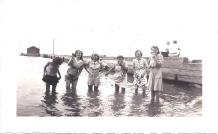In 1925, the invitation of
an Ohio tobacco farmer to
sharecrop his land on tiny
Pelee Island in Southwestern
Ontario offered a new start
to 38 refugees. Six Mennonite
families were among the
thousands of German-speaking
Mennonites fleeing the Soviet
Union (present-day Russia and
| Ukraine) in the troubled
years following the Russian
Revolution. The Island
Mennonite people were either
Frisian, from Northern
Holland, with names such as
Wiebe, or Flemish from
Southern Holland, with names
such as Dick (originally
Dyck). The ancestors of these
| Anabaptist-Mennonite families
had left the Netherlands in
the mid-16th century due to
religious persecution. After
two centuries in
Poland/Prussia, they migrated
to the southern lands of the
Russian Empire and settled in
what is today Ukraine. The
Mennonite people prospered
| there for over 100 years, but
in early 20th century,
revolution, world war, and
civil war brought death and
destruction to their
communities and families. And
so in the 1920s, about 25,000
Mennonites left the Soviet
Union for Canada, United
States, Brazil, and Paraguay.
|




